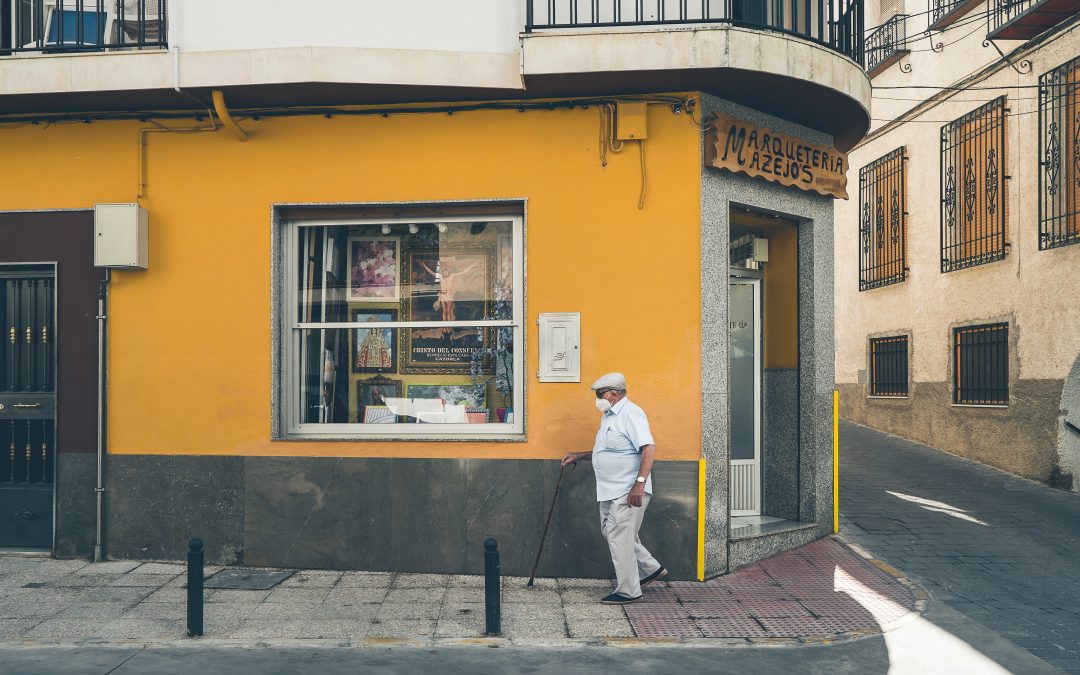Justice Studio Research: Impact of COVID-19 on 70+ adults in self-isolation.
Part I: Spain
What was the immediate effect of isolation on older adults across the UK, Spain and the USA? In this series, Justice Studio presents the findings of our innovative peer impact research on the experiences of shielding adults aged 70 and over.
Beginning in early April 2020 as each country had rapidly shut down, our research covered the lockdown period concluding after the Spanish state of emergency ended in June 2020. Here we explore the early concerns that our participants confronted in the face of this experience.
‘I have too much information, but I don’t know what’s going on’
Patricia*, an 83-year-old woman from a small town in Northern Spain, has been alone in her house for around two weeks. On March 15, the Spanish Government approved a state of alarm that instantly locked down the nation, restricting the movement of people across the whole territory. For Patricia, who recently lost her husband due to cancer, the beginning of the COVID-19 was overwhelming. The availability of permanent and updated information from multiple media channels did not equate to clarity. As she expressed, ‘I have been inundated with information from the radio and the TV, I have too much information, but I don’t know what’s going on.’
With an increasing number of debates and special media content exploring the origins of the pandemic and the effects that it can have on human beings, most of the Spanish research participants described emerging feelings of confusion and fear. As Ramiro, who is 71 and lives in rural Southern Spain, explained, ‘this information overload is making me feel more and more scared, I feel like I’m being attacked with all this excessive data.’ For Martina, a 75-year-old retired teacher, the most important thing would be to have ‘trustworthy information, I’d love to have less information, but data which I can really trust.’
When the state of alarm was implemented in mid-March, the Government’s measures were meant to cover the following 15 days. However, they ended up lasting for more than three months until June 21. For seven out of our eleven research participants, an explanation regarding the reasons why the Government approved these measures was missing. Among our participants, a minority of five noted that it would have been useful to receive a letter from the government rather than spending time searching for information by themselves from various media sources.
While most of the participants believed that more information on the steps taken by the Government would have been beneficial, most of them also agreed that both the President Pedro Sanchez and his team had done as much as it was in their power to tackle an unexpected crisis. As Patricia said, ‘you can’t please all of the people all of the time; some people say that the Government reacted too late, but if they would have taken action earlier on, they would have said that there was no need to spread fear too early.’ Ramiro, who defined himself as ‘apolitical’, considered that ‘the Government has provided enough information, and that, through the Central Government, both regional governments and health workers have received enough information.’ For him, ‘using COVID-19 as a political tool against the Government is disloyal, not only to the Government but to Spaniards ourselves.’
Preliminary changes to everyday life
During conversations with our participants, a key emerging issue had to do with the changes that COVID-19 had brought to their everyday lives. Three distinct activities: access to food, access to money, and mental and physical health, led them to see life through the lens of pre- and post-COVID.
Access to food
‘I used to go grocery shopping by myself, it was an opportunity to go for a walk, socialise and get out of my place, but I cannot do this now’, explains Dolores, who lives by herself in a coastal city in Eastern Spain. Her case does not differ from that of most of the research participants. Martina expressed feeling ‘loved’ by her family members, an emotion that had been strengthened since lockdown started. As she explained, ‘I haven’t left my house since lockdown started, and my children have been bringing food that they leave by the lift for me to pick up when it reaches my floor.’ Several participants said that they had also called small corner shops whose owners they had known for a long time to have food delivered. They said that, after receiving the food, they would leave all packages in their patios for several hours until they were convinced that the germs had disappeared to reduce the risk of infection.
Only three out of eleven interviewees, all of them aged 70-71, described that they were still going to the supermarket by themselves. This was despite the Government urging adults older than 65 to stay home due to being considered high risk population. Clara, a 70-year-old retired nurse, explained that, ‘I like to buy my food myself, because I want to see what condition it is in. I choose what I like. I don’t want it to be brought home to me, no, no, no.’ Two other participants explained that they would only leave the house once a week to buy food, which was an opportunity for them to break the isolation routine and feel ‘alive’.
Access to money
When asked whether they had experienced any problems accessing money to continue purchasing necessity goods, such as food and medicines, all participants explained that they had been completely fine since the lockdown began. While nine out of eleven mentioned that their family members were paying for what was needed (e.g. food, medicines, bills), two of them said that they were still leaving the house every week to withdraw money. Our research revealed that bank cards were not used by a majority of participants, who preferred to visit the bank using their savings books to receive cash directly from the employees in large sums of money that they would keep at home.
Half of the participants trusted their children to withdraw money using their bank cards or savings books, while the rest had either borrowed cash from other relatives and neighbours or shared their card with a neighbour they trusted. One of them explained that a family member had brought a large amount of cash for her to then pay other people for food and medicines since she did not feel comfortable sharing their credit card pin code. Even though most interviewees expressed feeling comfortable regarding their access to money, one of them shared that the COVID-19 crisis had made her revive her post-war experiences. Considering that some of the participants grew up in the aftermath of the Spanish Civil War, this is not surprising. For 90-year-old Dolores, ‘this situation is very stressful, it makes me think of the post-war period, and I’m scared that one day I’m going to wake up with no money in my account.’
For some interviewees, the biggest worry was not their own financial situation and access to money, but instead that of their children and close relatives. In fact, six of them linked the anxiety and stress that COVID-19 had brought to them to the difficulties faced by their family members. For example, Rita, a 75-year-old retired business owner, said that, ‘I am very worried, of course, and not about me, but about my children because I have to support them with my own money since they are unemployed, and this will only make things worse than they already were.’ For 77-year old Luisa, who lives by herself in rural Southern Spain, ‘this is a source of stress because my two children have been furloughed, and I don’t know when they’ll get the Government’s money, but they still have to pay the mortgages for their cars and homes; I don’t know what will happen to them.’
Mental and physical health
As all of our participants were selected because of their underlying health conditions, many were taking medicine. For the majority (ten out of the eleven) the COVID-19 pandemic had not altered their access to their treatments. Additionally, they expressed having all the required information on how to continue purchasing medicines once their prescription had finished despite not being able to renew it directly with a doctor. Martina was the only one who said otherwise, stating that, ‘I don’t know what to do when I run out of pills, because I don’t know how to get the doctor’s signature that I need get them.’
‘We are currently two people at home at the minute, solitude and me’, says Patricia. With this statement, she summarised the feelings that nine of the participants shared with our peer researchers. As Clara explains, ‘I’m comfortable at home, but I’m alone, and my loneliness has increased, I was already by myself before COVID-19, but this confinement has made me feel even lonelier.’ For some interviewees, this solitude had worsened mental health issues such as depression, anxiety and stress that they experienced in the past, while for others it was a new problem that they had not faced before.
A group of four participants described suffering from depression, which got worse since the lockdown started. Summarising these experiences, Patricia said that, ‘I live alone, and I have two children, who are great and help me a lot, but I’ve been alone for several weeks now, I’ve had a depression for a long time and I cannot even sleep.’ The vast uncertainty brought by the COVID-19 crisis in relation to, among other issues, its potential duration, shifting government plans and contradictory news received from the media, combined with the loneliness of being in self-isolation have constituted a dangerous cocktail for most of our Spanish interlocutors.
Only a minority of interviewees (two out of eleven) were optimistic in stating that COVID-19 had not affected their mental health at all. As Marta, who is 78 and lives by herself, stated, ‘I am okay, because I am used to being alone, and I’m always on the phone with my brothers, children and grandchildren.’ Rosa, who is 89 and also lives alone, explained that, ‘I know that no one was prepared to face this crisis but, personally, I’m not having a bad time, I’m fortunate to have lots of friends, who love me and whom I love, who call me every day, so I stay active.’
***
The evidence from this study suggests that, among our participants, receiving more information directly from Government’s sources rather than media platforms would have been useful to reduce the uncertainty brought by COVID-19. As they noted, the permanent reception of mixed messages from, among others, TV and radio stations brought more stress than comfort.
Whilst none of those interviewed experienced problems obtaining food and money because they had received assistance from family members and friends, whilst others kept buying at the supermarket and going to their local bank and ATM by themselves, the biggest impact of COVID-19 appears to be on mental health. Participants reported worsening depression, anxiety, stress and fear. Although access to medication was not affected by the pandemic, one of the participants expressed being uncertain about how to continue purchasing medicines without a prescription.
Now we could really use your help to understand more about older people’s experiences. We are recruiting survey participants in the USA, UK, and in Spain who are 65+. Please spread the word to anyone you know who may be eligible and interested. The survey can be taken here.
* All names have been changed to preserve confidentiality.
Featured photo by Ewien van Bergeijk from Unsplash.

